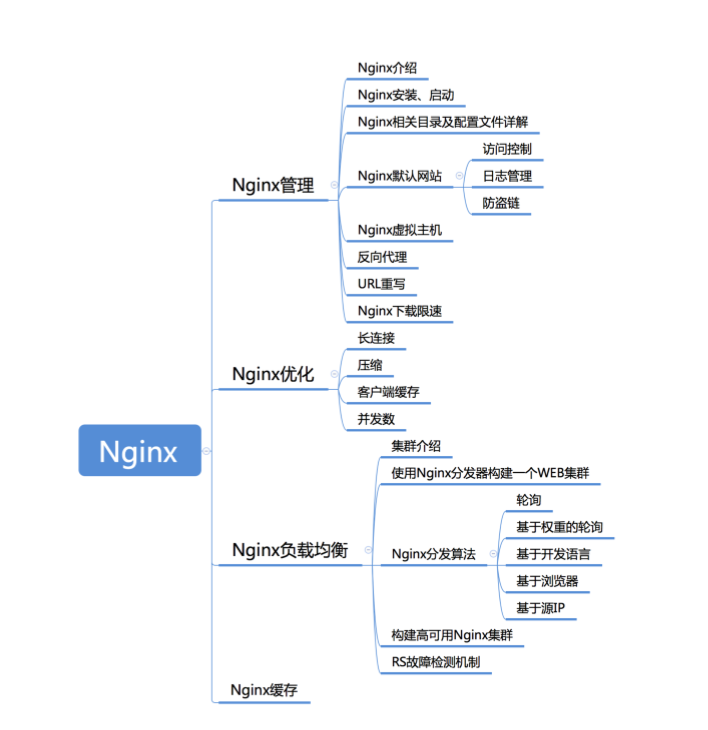01 - nginx - 安装、配置文件、默认网站、虚拟主机
一、运维:

1. 介绍服务器。 服务器逻辑: 服务器选择 操作系统 部署逻辑 业务环境部署逻辑 业务部署图 软件部署文档 日常维护文档 测试 开发上传代码到源码系统 上线 - 测服务器,内测 预发布测试,公测 上线 产品需求确认 产品研发确认 产品测试确认 产品流程文档 跟踪统计用户反馈情况 2. 架构部署,自测环境,预生产环境,生产环境。
二、Nginx:
Apache: 消耗资源 Nginx介绍: 轻量级的WEB服务器,和反向代理服务器 延伸版本tengine(淘宝)、openresrt(章亦春)等 官网:http://nginx.org 中文文档:http://www.nginx.cn/doc/index.html Nginx管理 Nginx优化 Nginx负载均衡 Nginx缓存 环境: 1. Vmware虚拟机 2核4G 2. 网卡:桥接 3. centos7.5 4. 防火墙:关闭 5. Selinux:关闭 6. 网段:192.168.10.0/24 主机名 IP 角色 Master.ayiltuan.com 192.168.10.40 主分发器 Backup.aliltuan.com 192.168.10.41 备分发器 Web01.ayituan.com 192.168.10.42 数据服务器1 Web02.ayituan.com 192.168.10.43 数据服务器2 Nginx目录: 安装 相关目录介绍 启动 验证测试
三、Nginx的安装:
http://nginx.org 1、Nginx安装 1.1)获得软件 wget http://nginx.org/download/nginx-1.15.5.tar.gz -P /usr/src 1.2)安装前准备 cd /usr/src tar xf nginx-1.15.5.tar.gz cd nginx-1.15.5 yum -y install gcc pcre-devel zlib zlib-devel 1.3)配置 1)检查环境 是否 满足安装条件 依赖解决 2)指定安装方式 配置文件 命令文件 各种文件放哪里 开启模块功能【内 置模块 三方模块】 3)指定软件安装在那里 ./configure --prefix=/usr/local/nginx 1.4)编译 使用gcc将源码生成可执行程序 make -j4 1.5)安装 make install 2、相关目录 nginx path prefix: "/usr/local/nginx" nginx binary file: "/usr/local/nginx/sbin/nginx" nginx modules path: "/usr/local/nginx/modules" nginx configuration prefix: "/usr/local/nginx/conf" nginx configuration file: "/usr/local/nginx/conf/nginx.conf" nginx pid file: "/usr/local/nginx/logs/nginx.pid" nginx error log file: "/usr/local/nginx/logs/error.log" nginx http access log file: "/usr/local/nginx/logs/access.log" 3、Nginx启动 /usr/local/nginx/sbin/nginx 4、验证 netstat –ntpl lsof -i :80 yum -y install lsof 5、浏览器测试 elinks 文本界面浏览器 elinks http://192.168.10.42 --dump 百度:(方法比技能更重要!)

四、Nginx的配置文件:
/usr/local/nginx/conf/nginx.conf
#启动子进程程序默认用户
#user nobody;
#一个主进程和多个工作进程。工作进程是单进程的,且不需要特殊授权即可运行;这里定义的是工作进程数量
worker_processes 1;
#全局错误日志的位置及日志格式
#error_log logs/error.log;
#error_log logs/error.log notice;
#error_log logs/error.log info;
#pid logs/nginx.pid;
events {
#每个工作进程最大的并发数
worker_connections 1024;
}
#http服务器设置
http {
#设定mime类型,类型由mime.type文件定义
include mime.types;
#
default_type application/octet-stream;
#日志格式
#log_format main '$remote_addr - $remote_user [$time_local] "$request" '
# '$status $body_bytes_sent "$http_referer" '
# '"$http_user_agent" "$http_x_forwarded_for"';
#$remote_addr与$http_x_forwarded_for用以记录客户端的ip地址;
#$remote_user:用来记录客户端用户名称;
#$time_local: 用来记录访问时间与时区;
#$request: 用来记录请求的url与http协议;
#$status: 用来记录请求状态;成功是200,
#$body_bytes_sent :记录发送给客户端文件主体内容大小;
#$http_referer:用来记录从那个页面链接访问过来的;
#$http_user_agent:记录客户浏览器的相关信息;
#全局访问日志路径
#access_log logs/access.log main;
#sendfile指令指定 nginx 是否调用sendfile 函数(zero copy 方式)来输出文件,对于普通应用,必须设为on。如果用来进行下载等应用磁盘IO重负载应用,可设置为off,以平衡磁盘与网络IO处理速度,降低系统uptime。
sendfile on;
#此选项允许或禁止使用socke的TCP_CORK的选项,此选项仅在使用sendfile的时候使用
#tcp_nopush on;
#长连接超时时间
#keepalive_timeout 0;
keepalive_timeout 65;
#开启压缩
#gzip on;
#配置虚拟主机
server {
#虚拟主机使用的端口
listen 80;
#虚拟主机域名
server_name localhost;
#虚拟主机支持的字符集
#charset koi8-r;
#虚拟主机的访问日志路径
#access_log logs/host.access.log main;
#定义web根路径
location / {
#根目录路径
root html;
#索引页
index index.html index.htm;
}
#error_page 404 /404.html;
# redirect server error pages to the static page /50x.html
#
#根据错误码 返回对应的页面
error_page 500 502 503 504 /50x.html;
#定义页面路径
location = /50x.html {
root html;
}
#定义反向代理服务器 数据服务器是lamp模型
# proxy the PHP scripts to Apache listening on 127.0.0.1:80
#
#location ~ \.php$ {
# proxy_pass http://127.0.0.1;
#}
#定义PHP为本机服务的模型
# pass the PHP scripts to FastCGI server listening on 127.0.0.1:9000
#
#location ~ \.php$ {
# root html;
# fastcgi_pass 127.0.0.1:9000;
# fastcgi_index index.php;
# fastcgi_param SCRIPT_FILENAME /scripts$fastcgi_script_name;
# include fastcgi_params;
#}
# deny access to .htaccess files, if Apache's document root
# concurs with nginx's one
#
#拒绝apache DR目录及子目录下的.htaccess文件访问
#location ~ /\.ht {
# deny all;
#}
}
# another virtual host using mix of IP-, name-, and port-based configuration
#
#server {
# listen 8000;
# listen somename:8080;
# server_name somename alias another.alias;
# location / {
# root html;
# index index.html index.htm;
# }
#}
#https的配置方案
# HTTPS server
#
#server {
# listen 443 ssl;
# server_name localhost;
# ssl_certificate cert.pem;
# ssl_certificate_key cert.key;
# ssl_session_cache shared:SSL:1m;
# ssl_session_timeout 5m;
# ssl_ciphers HIGH:!aNULL:!MD5;
# ssl_prefer_server_ciphers on;
# location / {
# root html;
# index index.html index.htm;
# }
#}
}
操作验证:
useradd -s /sbin/nologin -r www # 创建一个 www用户
#启动子进程程序默认用户
#user nobody; # www
worker_processes 1; # 有几个核,就写几个 4
killall nginx
yum search killall
yum -y install psmisc
/usr/local/nginx/sbin/nginx
lsof -i :80
实现了负载均衡;每个工作进程下:最多1024个并发数;

五、Nginx默认网站、访问控制、登录验证、日志管理、防盗链、日志截断
../sbin/nginx -g ../conf/nginx.conf
验证是否 ok 在重启
关了,在重启:
killall nginx
/usr/local/nginx/sbin/nginx
重启:
killall -s HUP nginx
1、默认网站 当Nginx配置⽂文件中有且只有只一个Server的时候,该Server就被Nginx认为是默认网站, 所有发给Nginx服务器80端⼝口的数据都会默认给该Server. server { listen 80; server_name localhost; location / { root html; index index.html index.htm; } error_page 500 502 503 504 /50x.html; location = /50x.html { root html; } } 2、访问控制 location /a { allow 192.168.1.0/24; deny all; #return 404; return http://www.jd.com; } 3、登陆验证 auth_basic 语法: auth_basic string | off; 默认值: auth_basic off; auth_basic_user_file file; location /b { auth_basic ”登陆验证"; auth_basic_user_file /etc/nginx/htpasswd; } 4、日志管理 Nginx访问日志主要有两个参数控制 log_format log_format #用来定义记录日志的格式(可以定义多种日志格式,取不同名字即 可) access_log #用来指定日至文件的路径及使用的何种日志格式记录日志 access_log logs/access.log main; log_format格式变量: $remote_addr #记录访问网站的客户端地址 $remote_user #远程客户端用户名 $time_local #记录访问时间与时区 $request #用户的http请求起始行信息 $status #http状态码,记录请求返回的状态码,例如:200、301、404等 $body_bytes_sent #服务器发送给客户端的响应body字节数 $http_referer #记录此次请求是从哪个连接访问过来的,可以根据该参数进 行防盗链设置。 $http_user_agent #记录客户端访问信息,例如:浏览器、手机客户端等 $http_x_forwarded_for #当前端有代理服务器时,设置web节点记录客户端 地址的配置,此参数生效的前提是代理服务器也要进行相关的x_forwarded_for设置 案例 自定义一个json格式的访问日志 log_format main_json '{"@timestamp":"$time_local",' '"client_ip": "$remote_addr",' '"request": "$request",' '"status": "$status",' '"bytes": "$body_bytes_sent",' '"x_forwarded": "$http_x_forwarded_for",' '"referer": "$http_referer"' '}'; access_log logs/access_json.log main_json; 5、防盗链 location /images/ { alias /data/images/; valid_referers none blocked *.ayitula.com; if ($invalid_referer) { rewrite ^/ http://www.ayitula.com/daolian.gif; #return 403; } } 6、日志截断 mv access.log access.log.0 killall -USR1 `cat master.nginx.pid` sleep 1 gzip access.log.0
六、Nginx虚拟主机
就是把一台物理服务器划分成多个“虚拟”的服务器,每一个虚拟主机都可以有独立的域名和独立的目录
同时发布两个网站:
DocumentRoot /usr/local/nginx/html/web1
DocumentRoot /usr/local/nginx/html/web2
1、基于IP的虚拟主机
实现条件:
1) 两个IP
2)DR 存在
3)索引页 index.html
#每个网站都需要一个IP
#缺点 需要多个IP 如果是公网IP 每个IP都需要付费
逻辑网卡,添加子网卡
ifconfig
ifconfig ens33:1 192.168.10.52/24 up
mkdir /usr/local/nginx/html/web1
mkdir /usr/local/nginx/html/web2
echo web1 > mkdir /usr/local/nginx/html/web1/index.html
配置:
server {
listen 192.168.10.42:80;
location / {
root html/web1;
index index.html index.htm index.php;
} }
server {
listen 192.168.10.52:80;
location / {
root html/web2;
index index.html index.htm;
} }
运行:
../sbin/nginx -g nginx.conf # 测试一下。才能关掉,在启动。
killall nginx
../sbin/nginx # 启动
netstat -ntpl # 查看已经启动得进程
测试:
elinks http://192.168.10.42 --dump
elinks http://192.168.10.52 --dump
ok
2、基于端口的虚拟主机
#只需要一个IP
#缺点 端口你是无法告诉公网用户 无法适用于公网客户 适合内部用户
ifconfig ens33:1 down
配置:
server {
listen 80;
#server_name www.abc.com;
location / {
root html/web1;
index index.html index.htm index.php;
} }
server {
listen 8080;
#server_name www.abc.com;
location / {
root html/web2;
index index.html index.htm;
} }
启动:
../sbin/nginx -g nginx.conf # 测试一下。才能关掉,在启动。
killall nginx
netstat -ntpl
测试:
elinks http://192.168.10.42 --dump # 没加端口,默认是80
elinks http://192.168.10.42:8080 --dump
3、基于域名的虚拟主机
一个网站必然有一个域名
配置:
vim /etc/hosts
。。。
192.168.10.42 www.abc.com
192.168.10.42 www.cbd.com
server {
listen 80;
server_name www.abc.com;
location / {
root html/web1;
index index.html index.htm index.php;
} }
server {
listen 80;
server_name www.cbd.com;
location / {
root html/web2;
index index.html index.htm;
} }
测试:
elinks www.abc.com --dump # 没加端口,默认是80
elinks www.cbd.com --dump

